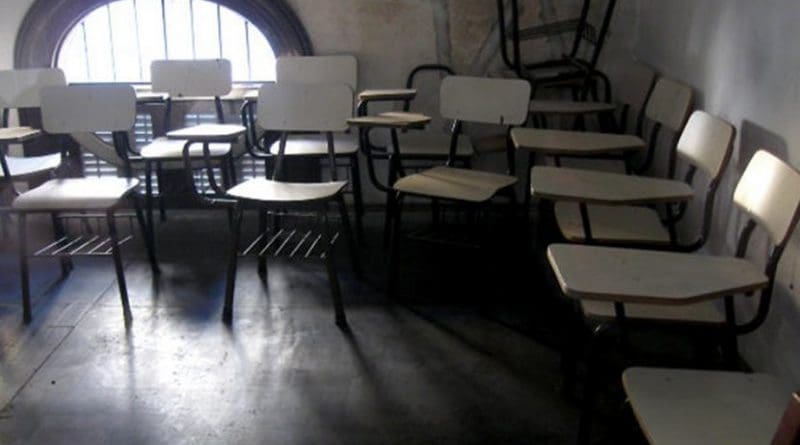Spain Establishes Closer Relations With France On Education To Face Challenges Of Coming Years
Spain’s Minister for Education and Vocational Training, Isabel Celaá, travelled to Paris with the aim of establishing closer relations between Spain and France on education to face the major challenges of the coming years.
The Government Spokesperson held meetings with both the French Minister for Education and with senior officials on education matters of the United Nations for Educational, Scientific and Cultural Organization (UNESCO) and the Organisation for Economic Cooperation and Development (OECD).
“At today’s meeting, Spain and France have committed to sharing our desire to reform and modernise our education systems, and we have agreed to boost language learning, foster vocational training exchanges and work together to consolidate European education projects”, highlighted Isabel Celaá.
The French Minister for National Education and Young People, Jean-Michel Blanquer, and his Spanish counterpart, Isabel Celaá, signed a declaration in which they expressed their intention to collaborate in the construction of the European Education Area, which will start to be implemented in 2025. This important initiative is designed for the exchange of students and teaching staff and to promote mobility. This comes on top of the already established European Higher Education Area (EHEA).
The two ministers have opted to pool their respective education systems and education reforms through which both countries aspire to offer a response to the challenges of the 21st century based on equality and excellence. Jean-Michel Blanquer and Isabel Celaá agreed on the need to decisively boost the modernisation of the education systems in both countries.
The Ministers for Education highlighted the importance of developing the linguistic skills of students and committed to promoting both Spanish in France and French in Spain, within their respective education systems. At present, 3.3 million students study Spanish in the French education system, which has become the second most widely studied foreign language (after English), and ahead of German (900,000 students) and Italian (200,000 students). More than 25,000 teachers give Spanish lessons at French education centres.
Enhancing mobility for students and teachers
In the joint declaration, Isabel Celaá and Jean-Michel Blanquer highlighted the success of the Bachibac Programme, thanks to which students obtain a dual qualification (French baccalaureate and Spanish bachillerato – Advanced Secondary Education), which enjoyed its tenth year of operation in 2018.
During the present academic year, there are 81 Bachibac courses at 27 of the 31 French academies, with 4,800 students. In the same academic year in Spain, there are 111 Bachibac courses in 13 of the 17 autonomous regions, with 2,945 students.
Both governments intend for the Bachibac Programme to continue developing, diversifying and thus enhancing the mobility of students and teachers, particularly through the development of collaborations and projects between different education centres in the two countries and between French academies and regional governments.
Isabel Celaá and Jean-Michel Blanquer also agreed to cooperate in the area of vocational training to foster partnership agreements between education centres, as well as the mobility of students and teaching staff through study trips and exchanges of experiences and good practices that enhance the employability of the young people of both countries. Both governments aim to design certifications that are recognised in both Spain and France.
The ministers also agreed to set up a bilateral committee of experts to monitor the aims of the declaration signed on Monday. This committee will hold its inaugural meeting this year, and will then meet on an annual basis, alternating between France and Spain.
Spain, potential new headquarters of the International Bureau of Education (IBE)
The Minister and Government Spokesperson, Isabel Celaá, met with the Assistant Director-General for Education of UNESCO, Stefania Giannini. In Paris, the former advocated the Government of Spain’s interest in hosting the UNESCO International Bureau of Education (IBE), currently located in Geneva (Switzerland). A decision will be taken on this in the coming months.
Isabel Celaá outlined to Stefania Giannini the draft education reform approved on Friday by the Government of Spain, which complies with the goals of the 2030 Agenda, specifically with Sustainable Development Goal 4 (SDG 4), to ensure inclusive and equitable quality education and promote lifelong learning opportunities for all.
UNESCO welcomes “with tremendous satisfaction the priority given by the Government of Spain to the 2030 Agenda on education, which places it as one of the benchmarks in Europe regarding the Sustainable Development Goals”, underlined Stefania Giannini.
“The draft education reform outlined by the minister is in line with the goal of ensuring inclusive and equitable quality education in line with SDG 4”, highlighted the Assistant Director-General for Education of UNESCO.
Isabel Celaá also held a meeting with the Director of the Directorate for Education of the OECD, Andreas Schleicher, to whom she specified the measures included in the Spanish education reform which seeks to enhance equality, quality and lifelong education.
”All the OECD studies show that student segregation increases inequalities”, pointed out Andreas Schleicher. “The separation of students by educational pathways is a system that more than half of all European countries have now abandoned. Studies show that this leads to low levels of equality without an improvement in general performance”, stressed the Director of the Directorate for Education of the OECD.
The Minister for Education and Vocational Training also held a meeting with the Spanish Ambassador to France, Fernando Carderera Soler, and visited the Federico García Lorca Spanish School.

